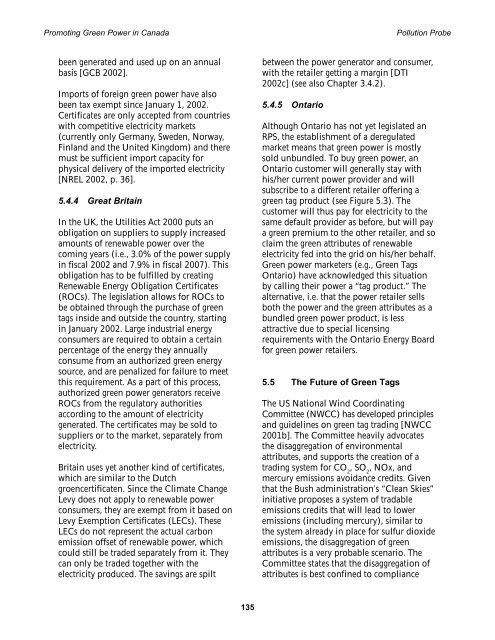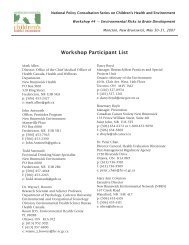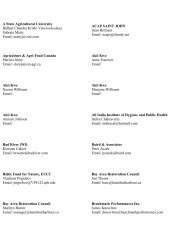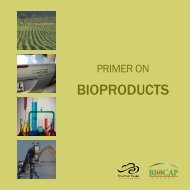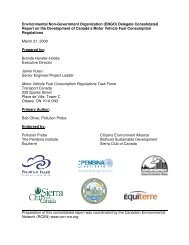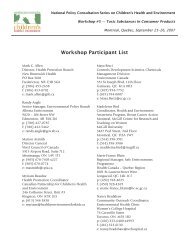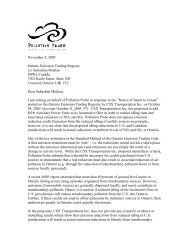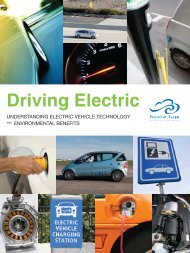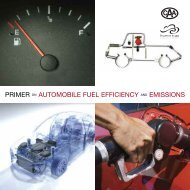Promoting Green Power in Canada - Centre for Human Settlements
Promoting Green Power in Canada - Centre for Human Settlements
Promoting Green Power in Canada - Centre for Human Settlements
- No tags were found...
You also want an ePaper? Increase the reach of your titles
YUMPU automatically turns print PDFs into web optimized ePapers that Google loves.
<strong>Promot<strong>in</strong>g</strong> <strong>Green</strong> <strong>Power</strong> <strong>in</strong> <strong>Canada</strong> Pollution Probebeen generated and used up on an annualbasis [GCB 2002].Imports of <strong>for</strong>eign green power have alsobeen tax exempt s<strong>in</strong>ce January 1, 2002.Certificates are only accepted from countrieswith competitive electricity markets(currently only Germany, Sweden, Norway,F<strong>in</strong>land and the United K<strong>in</strong>gdom) and theremust be sufficient import capacity <strong>for</strong>physical delivery of the imported electricity[NREL 2002, p. 36].5.4.4 Great Brita<strong>in</strong>In the UK, the Utilities Act 2000 puts anobligation on suppliers to supply <strong>in</strong>creasedamounts of renewable power over thecom<strong>in</strong>g years (i.e., 3.0% of the power supply<strong>in</strong> fiscal 2002 and 7.9% <strong>in</strong> fiscal 2007). Thisobligation has to be fulfilled by creat<strong>in</strong>gRenewable Energy Obligation Certificates(ROCs). The legislation allows <strong>for</strong> ROCs tobe obta<strong>in</strong>ed through the purchase of greentags <strong>in</strong>side and outside the country, start<strong>in</strong>g<strong>in</strong> January 2002. Large <strong>in</strong>dustrial energyconsumers are required to obta<strong>in</strong> a certa<strong>in</strong>percentage of the energy they annuallyconsume from an authorized green energysource, and are penalized <strong>for</strong> failure to meetthis requirement. As a part of this process,authorized green power generators receiveROCs from the regulatory authoritiesaccord<strong>in</strong>g to the amount of electricitygenerated. The certificates may be sold tosuppliers or to the market, separately fromelectricity.Brita<strong>in</strong> uses yet another k<strong>in</strong>d of certificates,which are similar to the Dutchgroencertificaten. S<strong>in</strong>ce the Climate ChangeLevy does not apply to renewable powerconsumers, they are exempt from it based onLevy Exemption Certificates (LECs). TheseLECs do not represent the actual carbonemission offset of renewable power, whichcould still be traded separately from it. Theycan only be traded together with theelectricity produced. The sav<strong>in</strong>gs are spiltbetween the power generator and consumer,with the retailer gett<strong>in</strong>g a marg<strong>in</strong> [DTI2002c] (see also Chapter 3.4.2).5.4.5 OntarioAlthough Ontario has not yet legislated anRPS, the establishment of a deregulatedmarket means that green power is mostlysold unbundled. To buy green power, anOntario customer will generally stay withhis/her current power provider and willsubscribe to a different retailer offer<strong>in</strong>g agreen tag product (see Figure 5.3). Thecustomer will thus pay <strong>for</strong> electricity to thesame default provider as be<strong>for</strong>e, but will paya green premium to the other retailer, and soclaim the green attributes of renewableelectricity fed <strong>in</strong>to the grid on his/her behalf.<strong>Green</strong> power marketers (e.g., <strong>Green</strong> TagsOntario) have acknowledged this situationby call<strong>in</strong>g their power a “tag product.” Thealternative, i.e. that the power retailer sellsboth the power and the green attributes as abundled green power product, is lessattractive due to special licens<strong>in</strong>grequirements with the Ontario Energy Board<strong>for</strong> green power retailers.5.5 The Future of <strong>Green</strong> TagsThe US National W<strong>in</strong>d Coord<strong>in</strong>at<strong>in</strong>gCommittee (NWCC) has developed pr<strong>in</strong>ciplesand guidel<strong>in</strong>es on green tag trad<strong>in</strong>g [NWCC2001b]. The Committee heavily advocatesthe disaggregation of environmentalattributes, and supports the creation of atrad<strong>in</strong>g system <strong>for</strong> CO 2, SO 2, NOx, andmercury emissions avoidance credits. Giventhat the Bush adm<strong>in</strong>istration’s “Clean Skies”<strong>in</strong>itiative proposes a system of tradableemissions credits that will lead to loweremissions (<strong>in</strong>clud<strong>in</strong>g mercury), similar tothe system already <strong>in</strong> place <strong>for</strong> sulfur dioxideemissions, the disaggregation of greenattributes is a very probable scenario. TheCommittee states that the disaggregation ofattributes is best conf<strong>in</strong>ed to compliance135


